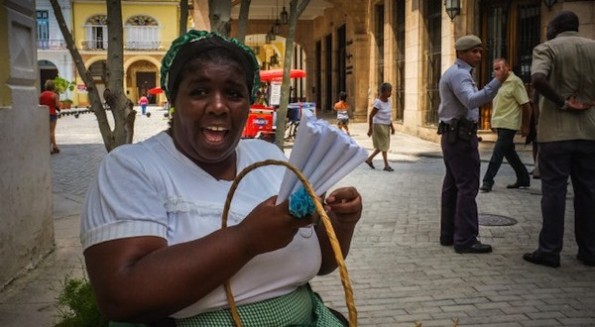 Now Eduardo is back. In the wake of the Second CELAC Summit, an omnibus with police and paramedics made a sweep of the beggars who were camping out in Vedado or Old Havana.
Now Eduardo is back. In the wake of the Second CELAC Summit, an omnibus with police and paramedics made a sweep of the beggars who were camping out in Vedado or Old Havana.
“I was in a shelter known as La Colonia, in Boyeros municipality (20 kilometers west of the center of the capital). The treatment was harsh. It looked like a jail. But at least they guaranteed lunch and food,” said the vagabond, who usually bets on an image of San Lázaro to ask for money at the entrance of a complex of exclusive shops in the Habana Libre hotel.
After being warned by the police, a group of alcoholics and beggars who usually sell used clothing and old books on the corner of Carmen and 10th of October in the slum of La Vibora, stayed away for a week.
“They told us we made the city look ugly. A police official said we should get lost until the end of the Summit. The important visits, like that of the Pope or meetings of presidents, together with the cold, are a pain in the neck for us, because we have to go to places outside the city. We live like gypsies. Almost all of us sleep in cartons in some doorway. In the neighborhood of la Calzada and 10th of October, we find a few pesos by doing metal plating, cutting stone, and some neighbors give us food,” remarked Ariel, a hopeless alcoholic.
Barely did the CELAC Summit end, when the beggars and dumpster divers returned to their work.
These events are also usually trouble for those who live on the margins on the law. Like Ramiro, a part-time transvestite, who prostitutes himself on the central avenues after work.
“During those days you walk around wound up. The police get very nervous. A client told me that they were mobilizing, since they expected groups of human rights marchers or public demonstrations. Once it was over, I returned to the struggle,” says Ramiro.
Hookers in the suburbs in the style of Gisela, pretty and with an easy laugh, also make sacrifices. “I’ve been arrested twice for prostitution. I have to be careful. When they celebrate meetings like this, I “nail myself in” (stay at home). Later I go back to the routine.
Numerous dissidents, among them the intellectual Manuel Cuesta Morúa and the attorney Veizant Boloy, should now be returning to their homes, after several days of detention in police dungeons, to prevent them from holding a parallel forum.
Other members of the opposition, independent journalists, alternative bloggers and human rights activists were prevented by State Security from leaving their homes, and their cell phones were cut off.
The Second CELAC Summit, celebrated in Havana from January 25 to 29, didn’t bring too many benefits to the people of Havana. Among the lucky ones were the residents on San Lázaro Street, from the University staircase up to the Fragua Martiana Museum, in the Cayo Hueso district.
Owing to the presence of a torch parade in honor of the 161st anniversary of the birth of José Martí, a coat of paint was given to the facades of some buildings and homes, and several streets got new asphalt.
Owners of private restaurants and family businesses in zones neighboring PABEXPO, were closed on the days of the event. “I have a cake business, for weddings and parties, that I had to close, because of the exaggerated police presence and prohibitions for the circulation of autos. The clients disappeared,” indicated Alexander, the owner of a sweetshop in Miramar.
The “fat” expected by owners of private restaurants, craft vendors, and private taxi drivers remained far below expectations.
“The truth is that almost no one who took part in the Summit came by here, unless it was one or another first lady, say,” said a seller of paintings on the Plaza de la Catedral.
Paladars of caliber like La Guarida, located in the heart of the marginal neighborhood of San Leopoldo, kept hoping for reservations by the heavyweights. In November 1999, when the Kings of Spain attended the IberoAmerican Summit celebrated in Havana, the Queen Doña Sofía dined in the famous paladar (as private restaurants are called).
Josefina had more luck, with her hair salon in Old Havana. She gave a haircut to the indifferent Secretary General of the United Nations, the South Korean Ban Ki-moon. Though how much he paid for the cut isn’t known.
Iván García
Photo: Old Havana. While the woman trumpets her cone of “peanuts, toasted and hot,” very close to her are a policeman and a man having an exchange of words. Taken from Cubanet.
Translated by Regina Anavy
1 February 2014
